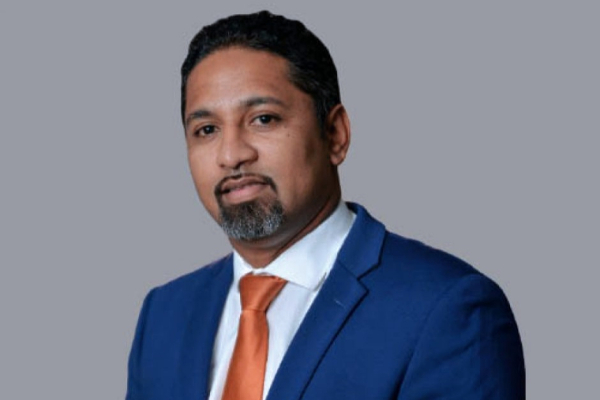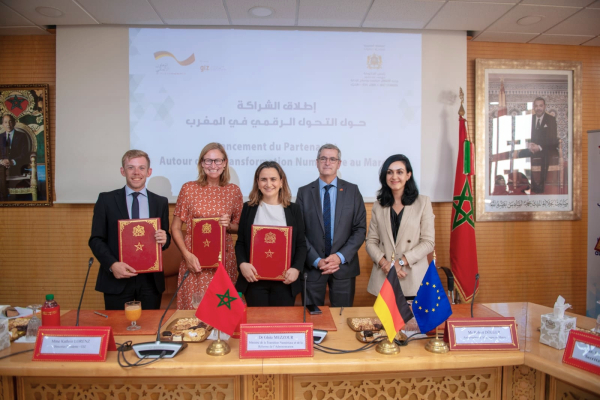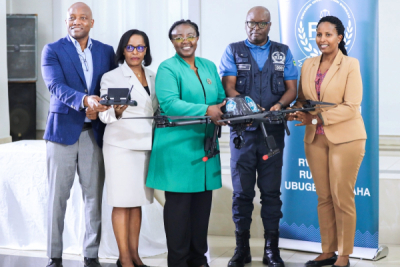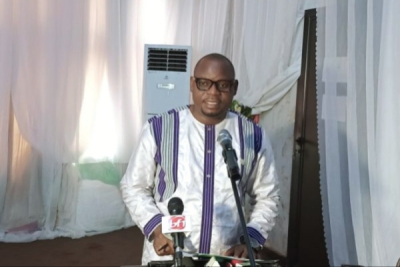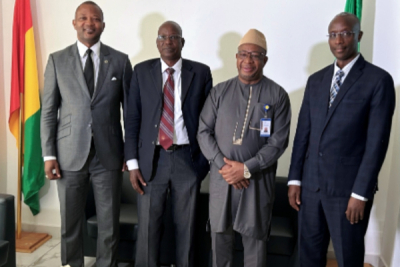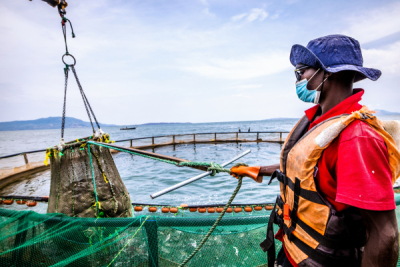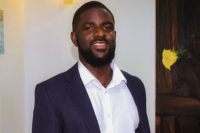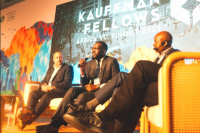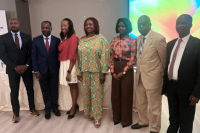Experienced in the banking and financial services sectors, he developed a passion for the blockchain and cryptocurrency industry. This led to the creation of Wakanda 4.0, a digital transformation company, in 2020.
Benito Elisa (photo) is the founder and CEO of Wakanda 4.0, a digital transformation company offering consulting, software development, training, business development, conference organization, graphic design, and video creation. He is also a seasoned professional with extensive experience in the banking and financial sectors.
The Mauritian-born entrepreneur holds a Bachelor's degree in Banking Law and International Finance, obtained in 2010 from the Mauritius University of Technology. He is also a graduate of the University of Mauritius, where he obtained a master's degree in marketing operations for personal and financial business services in 2013.
In 2020, when he launched Wakanda 4.0 Ltd, his vision was to become the most trusted digital partner to the Web 3.0 industry in the African and Middle Eastern regions. He also wanted to promote innovation and education on the African continent, where he believes there is enormous potential for growth and development.
Vice-Chairman of the Africa Emerging Tech Hub, Benito Elisa is also the founder and CEO of Fluffy Goodies, an e-commerce platform for personalized treats. He is also the official representative of Gulf Xellence, an event management and professional training company, in Mauritius.
A lecturer on fintech innovations at the Mauritius University of Technology, he is also an advisor to Nurika, a Nigerian AI-powered platform dedicated to promoting healthy lifestyles as well as encouraging the adoption of blockchain and cryptocurrencies.
Between 2010 and 2015, he worked as Bramer Bank's private banking relationship manager, and in the following two years, he was the financial services advisor to the Mauritian Ministry of Financial Services and Good Governance.
An alumnus of the La Plage Factory incubator, Benito Elisa is a winner of the 2022 edition of Africa's Most Respected CEO Awards for digital solutions in the blockchain and virtual assets industry.
Melchior Koba
Over the past few years, digital adoption and digitization have grown steadily across Africa. Well aware of the importance of that digital sector for the development of several sectors, Morocco is stepping up efforts to fully capitalize on the opportunities offered.
On Friday, September 15 in Rabat, the Moroccan Ministry of Digital Transition and Administrative Reform (MTNRA) and the German International Development Cooperation Agency (GIZ) signed two partnership agreements. The agreements aim to promote digital transformation of the public administration and the digital inclusion of very small and medium-sized enterprises (VSEs) and small and medium-sized enterprises (SMEs) in Morocco.
The first agreement, worth 3 million euros, will run for 3 years. It aims to support public agencies and institutions in their efforts to modernize services offered to citizens.
The second partnership, valued at 5 million euros, is dedicated to enhancing the technical and organizational capabilities of institutional stakeholders committed to promoting digital inclusion among SMEs. This initiative will oversee the development of mechanisms designed to lower transaction costs for service providers, ensuring the seamless digitization of SMEs and bolstering their capacity to leverage tailored services for their digital transformation. This agreement will be in effect for 4 years.
The new agreements complement several others recently signed with major national and international tech companies to promote the digital sector in Morocco. They are in line with Maroc Digital 2020– Now Maroc Digital 2025– that sets digital transformation of the public administration as one of its key focuses.
According to Ghita Mezzour (photo, center), the Minister Delegate in charge of Digital Transition and Administrative Reform, modernizing the administration is one of the Ministry's biggest projects, as it strives to increase efficiency and performance, and make administrative procedures and processes more transparent and accessible, in line with directives of the King of Morrocco.
For years now, drones have proven their worth in many fields. By providing aerial views of a given area, they give the ability to capture data that was previously inaccessible, making their use more important than ever.
Last Friday, the Rwanda Investigation Bureau (RIB) and the Ministry of the Environment jointly launched the use of drones to combat environmental crimes in the country.
The first drone, dubbed "Inganji I", will monitor, detect, and collect evidence that will be used to prosecute those engaged in activities that degrade the environment.
"The drones will help to respond to and control activities that damage our environment including land degradation, water pollution, and illegal logging in protected areas," said Environment Minister Jeanne d'Arc Mujawamariya (photo, center). According to the government official, who cited a recent report, illegal mining, community encroachment into protected areas and water pollution are the most environmentally degrading activities in the country.
The launch of this first drone is part of a long-term green growth and climate resilience strategy and an ambitious climate action plan set up a few years ago by the Rwandan government. The aim is to reduce carbon emissions by 38% by 2030 and achieve carbon neutrality by 2050.
The use of drones will thus play a crucial role in achieving these objectives. Among other things, it will help environmental inspectors carry out their tasks, collect information in prohibited areas, and provide accurate data.
Samira Njoya
On Friday, September 15, Edasso Rodrigue Bayala (photo), Burkina Faso’s Justice Minister, launched “e-casier judiciaire”, a web platform for the retrieval of criminal record certificates. The pilot jurisdictions on the web platform are the courts of Ouaga I and II. Later, the service will be extended nationwide.
Last September 13, Guinea's Water and Electricity Regulatory Authority (AREE) launched an AfDB-funded electronic management project in Conakry. The project, funded to the tune of $401,300, will modernize electricity regulation, improve decision-making thanks to real-time data, and encourage private-sector involvement through transparent information.
The Kenyan agritech company aims to be a modern and advanced alternative to its competitors. It uses megadata to improve its production.
Founded in 2015 by Joseph Rehmann and Steve Moran, Victory Farms is a Kenyan agritech company specializing in tilapia farming and commercialization. Through its web platform, users can purchase tilapia in bulk or per unit (depending on the size of the fish).
"We sell to mass market Africans via a highly innovative RTM cold chain which uses predictive data to push fish to thousands of market women every day all across Kenya with less than 1% spoilage. [...] This allows us to innovate and create more cost-effective solutions through our systems and the power of data to deliver a better, fresher product to more consumers," explained Joseph Rehmann, CEO of Victoria Farms, in 2022.
To place an order with Victoria Farms, buyers need to visit the startup’s web platform –as it currently has no mobile application, create an account, or sign in if they already have. They can then place their orders and pay using the mobile money service M-Pesa or via bank card before or at delivery.
To help buyers locate the nearest branches, the startup issued a USSD code that can be dialed to locate one or more of its 54 sales outlets where more than 15,000 market women stock up on fish.
Since its launch, the company has raised over $43 million to, among other things, improve its technology, develop its activities, and accelerate its growth both in and outside Kenya. “We’ve got several initiatives underway and planned to build the world’s first carbon-negative fish platform. And I think it’s very exciting because we’ve got a lot of tangible and measurable dimensions built into the business to achieve that,” indicated Joseph Rehmann.
Adoni Conrad Quenum
The e-commerce industry is experiencing remarkable growth in Africa. In Ghana, Felix Manford allows aspiring entrepreneurs to join this sector without the need for any initial capital investment.
Felix Manford (photo) is a Ghanaian entrepreneur and business leader with an impressive academic and professional background. He is the co-founder and CEO of Tendo, a startup that connects suppliers with Ghanaian drop shippers.
He graduated from the University of Ghana in 2018 with a Bachelor of Business Administration. In 2020, he founded Tendo to enable Africans to enter the e-commerce sector even without startup capital.
Tendo connects local wholesalers with independent retailers who can then select products they want to sell online, add their mark-up margins, advertise the products on social media, and earn money every time a purchase is made.
Before Tendo, “people who want to sell online [had] to save money, visit hundreds of suppliers to find a trusted one, and risk losing their capital by stocking up inventory. [They also had] to incur costs for logistics and warehousing. We eliminate all that,” said Felix Manford in 2022.
The startup, which is currently operational in Nigeria and Ghana, underwent the acceleration program of MEST Africa, in 2020. In 2021, it participated in Google's Black Founders Fund program. The following year, it also took part in Y Combinator’s winter program before being named (in 2023), by Make Money Media, as one of the 10 most successful African startups.
During his studies, Felix Manford worked in 2016 at UK Trade & Investment as a sales assistant in Ghana. In 2017, he was hired as a marketing and research officer at Global Trade Consult.
After graduating in 2018, he completed a one-month internship in global investment research at Goldman Sachs before being hired by the company in its Global Investment Research department.
Melchior Koba
Africa is a continent with immense potential for innovation and entrepreneurship, but it also faces many challenges. DFC Technology Hub is doing its part to address some of those challenges and foster a dynamic technology ecosystem.
DFC Technology Hub (DTH) was founded in 2021 by Felix Achibiri. It is a technology accelerator, startup incubator, and venture capital firm with a strategic initiative to accelerate the pace of technological development in Africa.
DTH works closely with founders and innovators to create technology solutions that will shape Africa's future, particularly in the fields of fintech, logistics, e-learning, and e-government. The platform it offers Africans is a valuable means of accessing a comprehensive range of resources essential to the growth of their technology businesses. These resources include financing, mentoring, training, technical support, a solid business network, and the opportunity to access global markets.
The accelerator also offers various programs tailored to different phases of the innovation process, from initial conception to product scale-up. For instance, its African Founders Accelerator program targets startups that have already validated their product on the market and are ready to expand their activities in Africa and beyond. It offers beneficiary startups financial support, mentoring, and privileged access to DTH's network of partners and investors.
For engineers and researchers working on cutting-edge technologies that can solve Africa's challenges, DTH offers the Makers & Builders Program. This program provides technical support, prototyping facilities, and access to the DTH research laboratory.
Finally, the Thinkers and Innovators Programme is aimed at entrepreneurs with disruptive ideas likely to shape Africa's future. It supports them in validating their concepts, developing prototypes, and launching minimum viable products.
To date, DTH has incubated 11 start-ups, contributing to the creation of over 751 direct jobs across Africa. Its ambitious goal is to support more than 250 startups in Africa over the next decade.
Melchior Koba
In addition to strengthening its presence in the region, the investment will enable the Nigerian company to provide secure and transparent payment services to consumers and businesses in Kenya.
Nigerian payment solutions provider Flutterwave recently announced plans to invest $50 million in Kenya. Olugbenga Agboola (photo, center), CEO and co-founder of Flutterwave revealed this during a media interview in the country's capital, Nairobi.
According to the CEO, the investment will be deployed as soon as the company receives regulatory approval from the Central Bank of Kenya (CBK).
"We are very optimistic about Kenya and once we get the license, our team in the country is ready to deploy the very next day. [...] We are happy we are going through the process of approval. We didn’t chicken out. We stayed the course even when everything stopped. The current administration is very supportive," he said.
Flutterwave's announcement comes a week after the company signed a partnership agreement with Indian financial institution IndusInd Bank to expand its services to India.
As far as Kenya is concerned, Flutterwave announced last April that it would be setting up its main operating station in Nairobi, for the East African market. This investment will be used to hire staff and develop Flutterwave's infrastructure in Kenya. Olugbenga Agboola also noted that the company already has more than two dozen employees in Kenya.
Founded in 2016 by Nigerians Olugbenga Agboola and Iyinoluwa Aboyeji, Flutterwave is now present in some 30 African countries. The Lagos and San Francisco-based startup is valued at around $3 billion.
Samira Njoya
With an Internet penetration rate of 33.63% in 2021, Liberia is gearing up to accelerate its digital transformation. To achieve this, the country needs strong allies it can count on.
At a workshop held on Tuesday, September 12 under the theme "Building a Digital Liberia- Bridging Vision and Transformation for Unleashing Future Development," the World Bank announced that it will support Liberia's digitization efforts to drive meaningful growth and development.
The UN organization will harness the power of technology to drive innovation, improve governance, and create economic opportunities for all Liberians, says Georgia Wallen, World Bank Country Director for Liberia.
"We’ll assess Liberia’s digital transformation journey and also look ahead — what can Liberia’s digital transformation economy look like in the future? [...] So, this is not only about adopting technology that is sustainable and benefits all but rather creating an entirely digital environment that is inclusive," she added.
The country is lagging in the digital transformation process compared to other African countries. However, it intends to catch up in this sector. According to data from the International Telecommunication Union, the country's Internet penetration rate is steadily rising. From 18.9% in 2018, it reached 33.63% in 2021.
For Worlea Saywah Dunah, Liberia's Minister of Posts and Telecommunications, the workshop is in line with the government’s strategy to transform the Liberian economy and enhance social development.
Social and economic development are the visions “ we aspired to as a nation in developing a vibrant ICT sector and this vision is captured in the President’s flagship agenda, which is called the PAPD. We are beginning to work with stakeholders in the sector and development partners to develop a 5-year national digital transformational agenda that will meet the best ICT standards through which we can achieve social and economic development as enshrined in the PAPD,” he said
Adoni Conrad Quenum
More...
With his fintech startup Kaoun, the entrepreneur facilitates and secures access to financial services for all Tunisians. His company's flagship product, Flouci, has won him several international awards and distinctions.
Nebras Jemel (photo) is a young Tunisian entrepreneur. In 2017, together with Anis Kallel and Rostom Bouazizi, he founded Kaoun, a fintech company that aims to improve financial inclusion.
To reform the financial system, Kaoun helps companies understand and monetize their data for better service and increased profitability. It assists governments in the development of comprehensive financial programs and supports the digitization of public administration.
In line with its mission, the company has developed a remote identification (E-KYC) solution to enable strong remote authentication of individuals during bank account opening or before making online payments. It has also developed electronic signature products to enable individuals and companies to sign documents remotely. These products are also used to securely store signed documents and share information quickly and efficiently.
The company's first product was Flouci, a financial app that offers fully digital access to free bank accounts, wallets for payments and transfers, and other financial services for the unbanked and underserved. In the 48 hours following the launch of Flouci, the app was downloaded 9,000 times and received 700 account opening requests.
Flouci aims "to become the standard app for financial inclusion in Tunisia. The Chinese model speaks for itself. The Alipay and WeChat Pay platforms are widely used, despite the widespread use of bank cards,” explained Nebras Jemel in 2020. In 2014, the latter was a summer researcher at the Fondazione Bruno Kessler, a European research institute focused on artificial intelligence. From 2015 to 2016, he worked as a research assistant at Harvard University's Center for Middle East Studies. Between June and July 2016, he worked for Legalist Inc., an institutional alternative asset management company, as a software engineer, participating in the development of a legal data platform for the company.
Nebras Jemel and his company have won several awards. In 2020, Kaoun became the first Tunisian startup to graduate from the Google for Startups Accelerator program. It also won the AfricaTech Awards in the fintech category at the VivaTech 2023 conference in Paris.
Melchior Koba
The adoption of technology across the continent presents numerous opportunities. Yet, realizing these opportunities hinges on equipping young people with digital skills. Many governments are creating opportunities to train their youth in this sector for development.
Kenya's ICT Authority has launched a program to promote digital skills among underrepresented groups. The program was announced in a tweet by the ICT Authority on September 12.
The initiative, the Presidential Digital Talent Program (PDTP), aims to equip 400 young Kenyans, including women, persons with disabilities, and those in Arid and Semi-Arid Lands (ASAL), with essential ICT skills.
The PDTP offers comprehensive training in network and infrastructure, software development, artificial intelligence (AI), graphic design, digital marketing, and data analysis.
The goal is to empower marginalized groups with digital skills for employment and entrepreneurship. By targeting ASAL regions, the program seeks to bridge the digital divide and ensure remote communities benefit from ICT.
Stanley Kamanguya, CEO of the ICT Authority, stressed the government's commitment to developing a skilled ICT workforce through PDTP. Digital skills play a vital role in leveraging technology across all sectors of the economy.
PDTP's comprehensive training is expected to boost Kenya's economy by diversifying the workforce. This will enable both the government and the private sector to tap into a talent pool driving innovation.
The program, set to run for 12 months, will provide participants with the expertise to thrive in the digital age. Kenya aims to become a regional hub for digital talent and innovation, fostering economic growth and inclusivity.
Kenyan nationals can apply at digitalent.go.ke until October 3, 2023.
Hikmatu Bilali
By providing valuable resources and fostering a supportive community, StartGate is helping to propel African startups onto the world stage.
StartGate is an innovation campus founded in 2020. Affiliated with the Mohammed VI Polytechnic University, it offers world-class infrastructure and resources to support entrepreneurs as they launch and develop their startups.
Its services include mentoring, business development support, and access to finance. It provides entrepreneurs with technological equipment and modern, open workspaces to stimulate their creativity.
The campus is home to several partner programs designed to help entrepreneurs at various stages of their journey. It includes Explorer, an innovation program offering entrepreneurial training, mentoring, and potential funding opportunities. Another program it offers is Entrepreneur Academy, which targets university and high school students, researchers, employees, and all types of aspiring African entrepreneurs, providing them with an introduction to and training in entrepreneurship.
There is also U-Founders, which deploys incubation, pre-incubation, and entrepreneurship awareness programs for students, researchers, and entrepreneurs belonging to the university's ecosystem.
Other notable programs include the African Youth Climate Hub, which provides resources and tools for young African climate entrepreneurs, and the Moroccan Retail Tech Builder, the first Venture Builder in Morocco –and Africa as a whole– dedicated to the digitization of the retail sector.
With Sarrah Chérif d'Ouezzan at the helm, StartGate has, since its creation, supported more than 624 entrepreneurs and start-ups from over 15 African countries. It has organized over 100 workshops and training sessions in 20 business sectors.
The campus hosts more than 10 support programs for the launch and development of startups. It has a network of 200 Moroccan and international mentors and experts and over 30 investors.
Melchior Koba
Alpha Direct was founded in 2014 but, it came into the spotlight in 2021 when it announced record sales of around $4.8 million during the previous financial year.
Founded in 2014 by Arun Iyer (photo), Alpha Direct is a Botswanan startup operating in insurance technologies. Headquartered in Gaborone, the capital of Botswana, it announced the completion of a $600,000 funding round, in 2021, to accelerate its growth.
The startup has developed an eponymous insurtech solution to enable users to purchase various insurance policies right from their smartphones. The solution is accessible through an Android app or a web platform. Through those mediums, a user can create an account and choose the insurance policy that best suits his or her needs (from car insurance to travel insurance) and get a quote. Once the quote is obtained, the user can subscribe to the chosen policies if he/she agrees with the conditions.
Apart from subscribing to policies, through the Android and web platforms, a user can also submit claims. All that is needed is to fill out a form providing all the relevant information to ensure rapid processing.
Since its launch, the mobile application has been downloaded over a thousand times. The startup plans to conquer other regions in Botswana and enter the Zambian and South African markets.
Adoni Conrad Quenum


